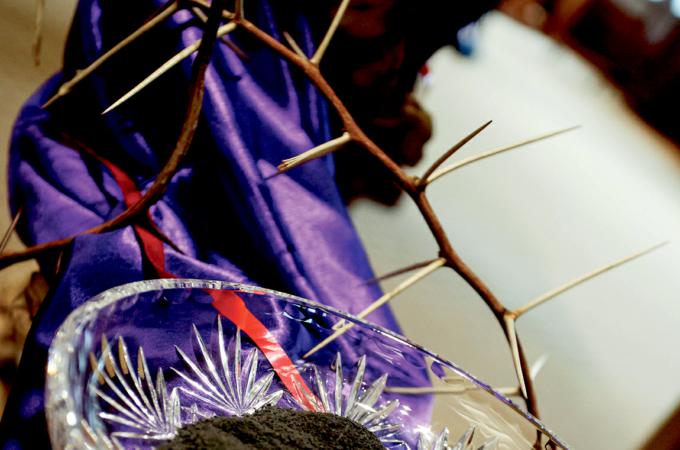Blessing of throats, Ash Wednesday will look different this year
BRAINTREE -- A pandemic may seem like the most fitting time to have one's throat blessed, or to repent with ashes on one's head. With this in mind, the archdiocese has issued guidelines and protocols for the blessing of throats on St. Blaise's feast day and the distribution of ashes on Ash Wednesday during the coronavirus pandemic.
The document was released on Jan. 14 following a meeting of the Presbyteral Council on the same day. The protocols are based on materials received from the Holy See and the United States Conference of Catholic Bishops (USCCB).
Regarding the feast of St. Blaise on Feb. 3, the USCCB referred to the Book of Blessings, which says a priest or deacon may give the blessing of throats "to all assembled by extending hands, without the crossed candles, over the people while saying the prayer of blessing."
"The current circumstances would certainly be considered a sufficient pastoral reason to avoid administration of the blessing to individuals in the usual manner, should there be any concern of danger due to the ongoing pandemic," the USCCB said.
The archdiocese further said that a pastor may allow individual blessings if he so chooses. However, "Every effort should be made to maintain a reasonable distance between the parishioner and the person doing the blessing. Both parties must wear masks. All participants in the rite should be trained in how to do it safely."
The tradition of blessing throats on St. Blaise's feast day has as its origin a legend that the saint miraculously healed a boy who was choking on a fishbone.
In a Jan. 6 statement on the same topic, the archdiocese suggested reminding parishioners that "the efficacy of the blessing lies in the intention of the priest or deacon, and not on the proximity of the priest or deacon to the recipient of the blessing."
The archdiocese also said parishes "should be particularly mindful" that people may be eager to have their throats blessed during the pandemic.
Regarding Ash Wednesday, which falls on Feb. 17 this year, the archdiocese referred to a note issued Jan. 12 by the Vatican's Congregation for Divine Worship and the Discipline of the Sacraments. The note was signed by the congregation's prefect, Cardinal Robert Sarah, and its secretary, Archbishop Arthur Roche.
To distribute the ashes, the priest is to say the prayer for blessing them and sprinkle them with holy water. He must then address all those present and say to them collectively, rather than individually, the words: "Repent, and believe in the Gospel," or "Remember that you are dust, and to dust you shall return." The priest is then to cleanse his hands, put on a face mask, and distribute the ashes by sprinkling them on each person's head, without making physical contact.
The archdiocese said that if a pastor has a reason to believe this method "would not be practical or accepted," he may administer the ashes with a cotton swab or some similar instrument, which can only be used once and be burned afterward.
Whichever method is used, the words should be said once at the beginning for the entire assembly rather than to each individual. The minister must not touch the recipient of the ashes, and both parties must wear masks.
It is also permitted to give packets of ashes for people to bring home.
In cases where a parish decides not to distribute ashes this year, "the internal disposition of the person attending the Mass or service should be stressed," the archdiocese said.
This echoed the archdiocese's Jan. 6 communication anticipating the USCCB's issuance of guidelines. At that time, the archdiocese said, "Parishioners should be reminded that their own internal disposition and intention to repent and start over is the best fruit of Ash Wednesday, and that the ashes are an external sign of that internal reality. They should be reminded that receiving ashes is not required. They can still enter into Lent with a repentant heart even if they decide that receiving ashes is not the right thing for them this year."



















